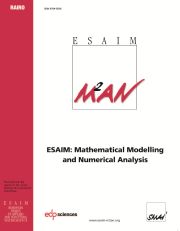Article contents
Propagation of Gevrey regularity over long times for the fully discrete Lie Trotter splitting schemeapplied to the linear Schrödinger equation
Published online by Cambridge University Press: 08 July 2009
Abstract
In this paper, we studythe linear Schrödinger equation over the d-dimensional torus,with small values of the perturbing potential.We consider numerical approximations of the associated solutions obtainedby a symplectic splitting method (to discretize the time variable) in combination with the Fast Fourier Transform algorithm (to discretize the space variable).In this fully discrete setting, we prove that the regularity of the initialdatum is preserved over long times, i.e. times that are exponentially longwith the time discretization parameter. We here refer to Gevrey regularity, and our estimatesturn out to be uniform in the space discretization parameter.This paper extends [G. Dujardin and E. Faou, Numer. Math.97 (2004) 493–535], where a similar result has been obtained inthe semi-discrete situation, i.e. when the mere time variable is discretized and spaceis kept a continuous variable.
Information
- Type
- Research Article
- Information
- ESAIM: Mathematical Modelling and Numerical Analysis , Volume 43 , Issue 4: Special issue on Numerical ODEs today , July 2009 , pp. 651 - 676
- Copyright
- © EDP Sciences, SMAI, 2009
References
- 4
- Cited by

